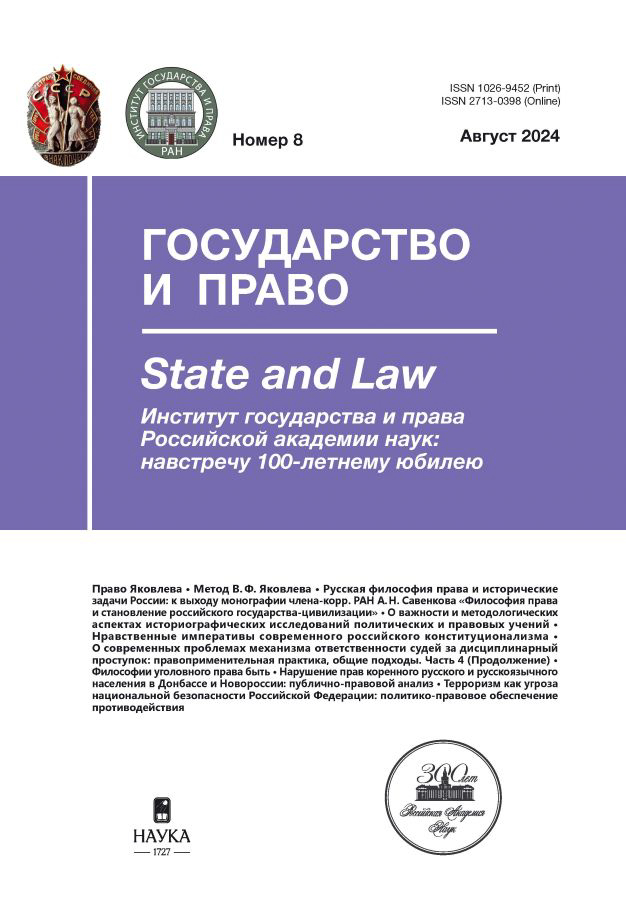On current problems of the mechanism of liability of judges for disciplinary misconduct: law enforcement practice, general approaches Part 4. Approaches to improving and improving the efficiency of the organizational and legal mechanism of disciplinary responsibility of judges (Continuation)
- Authors: Kleandrov M.I.1
-
Affiliations:
- Institute of State and Law of the Russian Academy of Sciences
- Issue: No 8 (2024)
- Pages: 61-73
- Section: Judicial power
- URL: https://journals.eco-vector.com/1026-9452/article/view/649094
- DOI: https://doi.org/10.31857/S1026945224080063
- ID: 649094
Cite item
Abstract
In the final, fourth part of the article, published in 2024 in the journal “State and Law”, certain results of the problems considered in its first three parts are summed up (part 1 – “Termination of the powers of a judge for a serious offense after the constitutional innovations of 2020 – constitutional or disciplinary responsibility?” (No. 3); part 2 – “On problems of disciplinary responsibility of court heads” (in two sections) (No. 4, 5); part 3 – “On the disciplinary responsibility of retired judges” (No. 6)). Conclusions are drawn about the imperfection of this mechanism with specific examples of law enforcement (and especially judicial) practice, including those caused by the imperfection of legislation in the area of public relations under consideration. Specific, including radical, proposals are being made aimed at improving and increasing the effectiveness of both the named mechanism as a whole and its individual links.
Full Text
About the authors
Mikhail I. Kleandrov
Institute of State and Law of the Russian Academy of Sciences
Author for correspondence.
Email: mklean@bk.ru
Corresponding Member of RAS, Doctor of Law, Professor, chief researcher
Russian Federation, MoscowReferences
- Abrosimova E. V. Judicial power in the Russian Federation: system and principles. M., 2002. P. 86 (in Russ.).
- Babek M. Administration of courts in the Czech Republic: in search of a constitutional balance // Comparative Constitutional Review. 2011. No. 4 (83). Pp. 25, 26 (in Russ.).
- Bespalov Yu. Problems of judicial independence and ways to solve them // Justice of the Peace. 2008. No. 8 (in Russ.).
- Zagidullin M. R. Legal responsibility in the Russian judicial civil procedure and alternative procedures for resolving legal conflicts. M., 2022. Pp. 4–6 (in Russ.).
- Kolesnikov E. V., Selezneva N. M. On increasing the responsibility of judges in the Russian Federation // Journal of Russ. law. 2006. No. 3. P. 28 (in Russ.).
- Kulikov V. Apparently, judges will also be punished // Ross. gaz. 2010. November 9 (in Russ.).
- Neshataeva T. N. On the independence of the court and judges in the digital age: integration experience // Protection and protection of civil and family rights in modern conditions: collection of scientific papers / res. ed. E. V. Mikhailova. M., 2022. P. 37 (in Russ.).
- Neshataeva T. N. Lessons of judicial practice on human rights: European and Russian experience. M., 2002 (in Russ.).
- Postnonclassics: philosophy, science, culture / res. ed. L. P. Kiyashchenko, V. S. Stepin. SPb., 2009. Pp. 249–295 (in Russ.).
- Rudnev V. I. Incompetence of a judge as a basis for his recusal and termination of powers // Journal of Russ. law. 2003. No. 7. Pp. 40, 41 (in Russ.).
- Collection of acts on the court and the status of judges of the Russian Federation. Issue 5: 3 books. M., 2012. Book 3. Pp. 89–92 (in Russ.).
- Stepin V. S. Modern civilizational crises and the problem of new development strategies. M., 2018. P. 24 (in Russ.).
- Judicial systems of Europe and Eurasia: scientific encyclopedia. ed.: in 3 vols. 1. Western and Northern Europe; Vol. 2. Southern and Eastern Europe; Vol. 3. Europe / ed. by R. A. Kurbanov, R. A. Gurbanov. M., 2019 (in Russ.).
- Khabrieva T. Ya., Chernogor N. N. The future of law. The legacy of Academician V. S. Stepin and legal science. M., 2020. P. 155 (in Russ.).
Supplementary files










